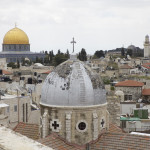(We have) a double task: the heart of ecumenism must be peace and the heart of peace must be ecumenism.
To meet this double challenge, Christians should reflect together on what might be “a theology of peace”. In the second half of the twentieth century, thanks to prophetic voices such as those of the Holy Pope John XXIII and Patriarch Athenagoras, and also thanks to the action of the World Council of Churches, has been made an important progress on the way to root deeply the Biblical message of peace in the collective life of humanity showing its necessary link with the promotion of justice and respect for creation.
But perhaps today we have a more urgent need to rediscover the foundations of a spirituality of peace. In fact, as pointed out by Pope Francis in his Exhortation, “we find that the locus of this reconciliation of differences is within ourselves, in our own lives, ever threatened as they are by fragmentation and breakdown” (EG 229). It is in Christ, who is “He Himself peace” (Eph 2:14), that the Christians of the East and the West have drawn this spirituality of peace, common to both Byzantine hesychasm and Benedictine monasticism. It is in this spirituality that many “witnesses of peace”, such as San Francesco d’Assisi, San Nersès of Lambron, Saint Silouan of Mount Athos and many others show and realize already now the unity of the Church.
From the message of Card. Kurt Koch, President of the Papal Council for Christian Unity to Brother Enzo Bianchi, Prior of Bose, to the brothers and sisters of the Monastery of Bose and the participants to the XXII International Ecumenical Conference on Orthodox spirituality. (Bose – 3/6 September, 2014)









